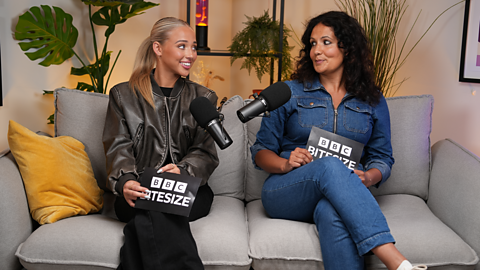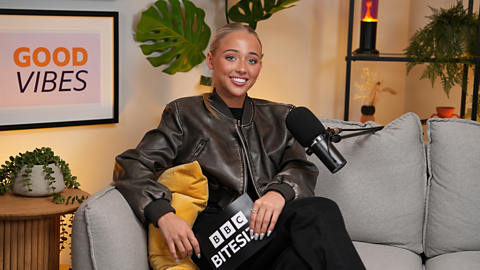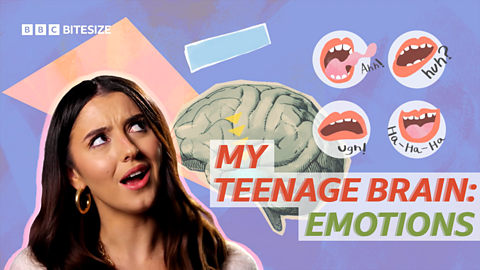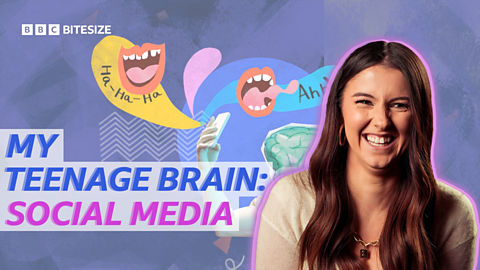Ami: That’s definitely something I do, I always think about the past and what I could have changed.
Hey guys.
I'm Ami Charlize.
Dr Radha: And I'm Dr Radha.
Welcome to World of Wellbeing from BBC Bitesize, where we talk about how to look after yourself and your mind.
Ami: So Radha, what is on your mind today?
Dr Radha: So we're talking about worrying which I think is something we can all relate to. So Ami, have you ever worried so much that it's affected what you can do sort of day-to-day?
Ami: Yeah, I am actually quite a big worrier, to be honest. I think it probably stems from when I was younger and danced, definitely. Growing up being a dancer, I feel like the pressure was on. So yeah, ever since then, I've just kind of been a bit of a worrier.
Dr Radha: Yeah, I can definitely relate. I've always been a worrier too. It’s always been something that I've kind of like, had to manage and kind of learn sort of strategies around. So for me, it was mainly about upsetting people or worrying that I hadn't done enough to help people, they're kind of two big areas where I kind of worry quite a lot. And I think it's really helpful to say that overthinking is really common. Like our brains were meant to think, our brains were designed to sort of almost get a problem and kind of try to tackle it. And it's great if that's what happens, but actually worrying is not always about that. So, you know, we can use our brains to think and to solve problems and to take action, but actually worry tends to be the opposite.
Ami: I literally worry about like anything, it could be like a splodge of makeup on my top and I'm like, ‘everyone's looking at it.’
Dr Radha: No one's looking at it.
Ami: Or it could be something a bit more deep, like you know, family, like their health. Like I always worry about my nan and things like that. So I think it's definitely important to know more about it.
Dr Radha: Helpful to kind of realise that worry comes from a place either being in the future, like lots of kind of ‘what ifs.’
‘What if this happens?’‘What if that happens?’
Or being stuck in the past,
so like ‘I should have done this,’ like ‘I could have done that.’
And it's very rare that, you know, if you're worrying, it's very rare like you're in the present moment, here and now. So I think that's a helpful thing to remember, because when you are worried about something, you can notice it and say to yourself, ‘right, am I in the future right now or am I back in the past? And how can I bring myself back to now?’ And that's definitely something I do. I always think about the past and what I could have changed, but in reality we can't change the past, which I think is really important. And our brains also, when we worry, they tend to kind of just have a life of their own and go into this spin, so we often kind of don't really kind of get things very clear in our heads. We kind of get them jumbled up and we sometimes jump to conclusions and assume things without any facts or evidence, because our minds are just like in this complete whirlwind basically. So when you're stuck in a bit of a rut, Ami, what do you do?
Ami: I just like to talk to someone. If it's my friends, my family, you know, my mum and my dad normally. Or maybe even my sisters.
Dr Radha: And actually they can help you sort of see the bigger picture, but also they can help you almost work out what is in your control to change about that and what isn't, because sometimes we get those two things mixed up, and we can spend a lot of time and energy trying to like, change things that we can't control.
Ami: Literally.
Dr Radha: Whereas actually if we put that energy towards actually things we can do and the sort of problem solving and the kind of actions we can take to actually make things better as well. It's definitely important to remember,you know, we all worry, but there is more to life than just thinking about the past and thinking about, ‘oh my God, what am I going to do in the future?’
Ami You know, like just live in the present and kind of float with that.
Dr Radha: Yeah, sometimes it's almost weirdly like a bit of a sense of relief about realising you're not in control of everything. Because if you are in control of everything, that's a lot of responsibility.
Ami: Just a bit.
Dr Radha: That's a lot of hard work. So sometimes, in a weird way, when you realise that actually you can't control things, you can take a breath and you can realise that actually, that's quite a relief, because I don't have to worry about everything. I can just worry about these three or four things right here, right now, and actually, I can do something about those as well.
Ami: Definitely.
So what would you kind of recommend to make me feel better when I am in that worried state?
Dr Radha: Yeah, so keeping a journal, maybe making some notes on your phone every time you feel that way. That way, you can kind of track how you feel, how your mood is, and maybe work out exactly what is causing you to worry.
Ami: Yeah, I definitely agree.
I like to write things down all the time, like on my notes and kind of, you know, like relate back to it, or I film myself, and like how I'm feeling and then go back every year and watch it. And I just think it's really cuteand like, I re-do it every year. But why does it actually make me feel better?
Dr Radha: I think it helps you work out what you're worried about, because sometimes we don't even know, we just feel worried, but we don't actually know specifically what is causing that worry. But also, it can help us work out what we can change. So a really great kind of idea is to take a bit of paper and draw a circle, write your worry at the top of the page and inside the circle you put all the things you can control, and outside you put all the things you can't control.
And then basically you focus on the things inside that circle and try to change them.
Ami: Definitely going to try that, that sounds like a good idea.
Dr Radha: I think it's also really helpful to have a bit of space from your worries as well. So whether or not that’s like exercising, or like drawing or listening to music, I think we need a balance between sort of looking atwhat we're worried about, but also having a little bit of mental space away from that.
Ami: I’ve took up like boxing and pilates, because it gives me an hourto just focus and concentrate on my PT and that's it.
Dr Radha: And I think it's really important to, take an hour, switch your phone off, just do what you need to do and it can be really helpful, so I like that.
Ami: Yeah.
So how do we know when the worrying is kind of getting a bit more serious?
Dr Radha: Yeah, so basically we can all feel worried or a bit anxious when we go to the dentist, for example, or we have like an exam, but anxiety is different. So anxiety is like a feeling of unease, and it comes from feeling really scared or fearful about something, and it can really affect us. And when it becomes a problem is when it becomes repetitive or recurrent, when it's affecting what we're able to do day-to-day, and also when we start to kind of get symptoms from it.
So we can even get physical symptoms, like shortness of breath. We can feel really anxious, it can affect our sleep and also we can sometimes even have panic attacks from it.
Ami: So I don't personally have anxiety, but I know a lot of people that do, some of my closest friends do, and I think it's definitely difficult for them to know what to do. I mean, they talk to a lot of people. They try to get it off their chest. But what would you recommend to someone that is suffering with anxiety?
Dr Radha: Yeah, it is so important then to get help from someone you trust, so a trusted adult, but also your GP can really help as well. So if you are finding anxiety is starting to affect what you're doing day-to-day, then talk to your parent, teacher, carer, but also your GP is there to help as well.
Ami: So if I'm feeling worried about something what can I do to make myself feel more calm?
Dr Radha: So in the moment you can do some breathing exercises which really help you relax. So we're going to do one of those now, if that’s alright, Ami?
Ami: Okay, cool.
Dr Radha: And everyone who's watching and listening.
So I want you just to kind of get comfortable, relax your arms and legs, and I want you just to take a deep breath in for four counts and then a deep breath out for eight. Five, six, seven, eight. And you keep doing that basically. Take a deep breath in for four counts and then a deep breath out for eight. Six, seven, eight. So how do you feel?
Ami: A lot more relaxed, definitely.
Dr Radha: Amazing, amazing.
Ami: It’s really, really good. Thank you for that.
Thanks so much for being with us.
Head to Bitesize Study Support to watch more episodes or search World of Wellbeing on BBC Sounds to listen now.
Bye!
Dr Radha: If something’s worrying you, then talk to someone you trust, that might be your parent, your guardian, your teacher or another friend. And if you’re struggling with your mental health, then start with your GP, that’s a great place for advice.
And remember, you can always contact Childline for free confidential information and advice as well.
Dr Radha helps us relax
In this episode of World of Wellbeing, Ami and Radio 1’s Dr Radha talk worries and feeling anxious. Dr Radha about how journaling can help with mental health and how practising breathing techniques can be an amazing way to relax.
Watch more World of Wellbeing
Ami Charlize and Dr Radha on the benefits of being active and sleep. video
Ami Charlize and Radio 1’s Dr Radha give some guidance on how exercise and being active can help boost your mood.

Ami Charlize and Dr Radha talk about friendships. video
Ami Charlize and Radio 1’s Dr Radha talk friendship fall-outs and growing apart.

Ami Charlize and Dr Radha open up about self-esteem and confidence. video
Ami Charlize and Radio 1’s Dr Radha talk affirmations, body confidence and bullying.

Ami Charlize and Dr Radha talk self-care, emotions and relationships. video
Ami Charlize and Radio 1’s Dr Radha chat about the benefits of practising self-care.

BBC Sounds: World of Wellbeing
The World of Wellbeing Podcast. audio
Listen to The World of Wellbeing Podcast on BBC Sounds.

I literally worry about everything… family – their health. I always worry about my nan. – Ami Charlize
If you need support
You should always tell someone about the things you’re worried about. You can tell a friend, parent, guardian, teacher, or another trusted adult. If you're struggling with your mental health, going to your GP can be a good place to start to find help. Your GP can let you know what support is available to you, suggest different types of treatment and offer regular check-ups to see how you’re doing.
If you’re in need of in-the-moment support you can contact Childline, where you can speak to a counsellor. Their lines are open 24 hours a day, 7 days a week.
There are more links to helpful organisations on BBC Action Line.
My Teenage Brain: Why am I so emotional?
Do you ever feel like you're on an emotional rollercoaster? Learn about why your feelings might feel so intense and some top tips about helping manage your emotions.

My Teenage Brain: Why can't I stop scrolling?
For some top tips on breaking your scrolling habit!

Easy recipes for revising and exam time
Meals and snacks to help you concentrate when studying.
